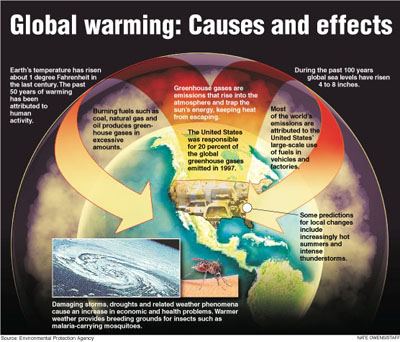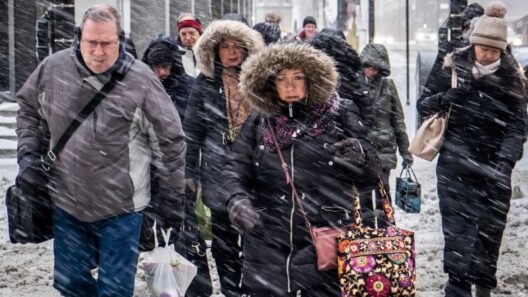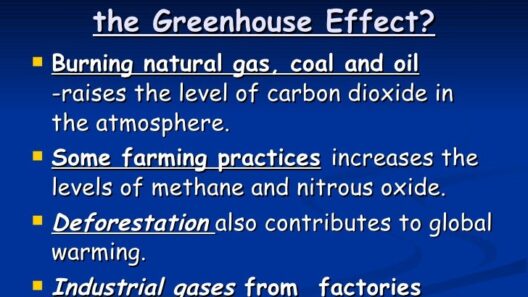The world is akin to a finely tuned orchestra, harmonizing elements of nature into a sublime symphony. Yet, this beautiful composition is threatened by a cacophonous intruder—burning fossil fuels. The emissions from this unrelenting practice are akin to a discordant note that disrupts the climate, leading to global warming. Understanding the science behind how burning fossil fuels drives climate change is crucial in our efforts to restore harmony to our planet.
To begin, we must unravel the complexity of fossil fuels. These hydrocarbon-rich substances—coal, oil, and natural gas—are formed over millions of years from the remains of ancient organisms. Once extracted and burned, they release energy, powering industries, vehicles, and homes. However, this process is not without consequences; it unleashes a barrage of greenhouse gases, particularly carbon dioxide (CO2), into the atmosphere. Picture the Earth as a greenhouse: it allows sunlight to enter but traps heat, creating a warming effect. When we burn fossil fuels, we enhance this greenhouse effect significantly.
The scientific community portrays CO2 as a chief culprit in climate change. This gas possesses unique thermodynamic properties, which enable it to absorb heat effectively. As concentrations of CO2 rise in the atmosphere, so does the planet’s temperature. The Intergovernmental Panel on Climate Change (IPCC) has unequivocally stated that human activities, particularly fossil fuel combustion, are driving this rapid increase in atmospheric CO2. The alarming reality is that the current levels of CO2 exceed those of the past 800,000 years.
Delving deeper into the scientific process, one cannot ignore the role of additional greenhouse gases. Methane (CH4), for example, is released during the extraction and combustion of fossil fuels. Although it remains in the atmosphere for a shorter period compared to CO2, methane is significantly more effective at trapping heat—many times more so. The unique interplay of these gases creates a feedback loop: as temperatures rise, additional methane can be released from natural sources, further exacerbating the problem.
The notion of climate feedback mechanisms becomes vital in comprehending the broader consequences of our fossil fuel dependency. Consider the melting of polar ice caps—these icy sentinels reflect sunlight back into space. When they melt, darker ocean water is exposed, absorbing more heat and intensifying global temperatures in a relentless cycle. Moreover, deforestation exacerbates the situation, as trees that once absorbed CO2 are removed, further amplifying atmospheric gas concentrations.
One might wonder about the direct effects of this warming. Rising global temperatures impact weather patterns, leading to more extreme phenomena—unprecedented heat waves, torrential rainfalls, and devastating hurricanes. These changes disrupt ecosystems, prompting species to adapt, migrate, or face extinction. The richness of biodiversity we cherish hangs precariously in the balance as habitats transform inexorably.
The socio-economic ramifications are equally profound. Climate change serves as a “threat multiplier,” exacerbating food and water scarcity, increasing health risks, and triggering displacement. Vulnerable communities, often least responsible for emissions, bear the brunt of climate impacts, facing increased poverty and instability.
Transitioning to renewable energy sources is not merely an option; it is an imperative for mitigating the effects of climate change. In the grand tapestry of life, fossil fuels represent a frayed and fading thread. Solar, wind, and hydropower emerge as promising alternatives, offering cleaner, sustainable solutions. Investing in these energies not only reduces greenhouse gas emissions but also fosters economic growth, creates jobs, and enhances energy security.
However, the path to this transition is replete with challenges. The entrenched interests of fossil fuel industries often manifest in political resistance, perpetuating policies that favor these outdated energy sources. Public awareness and grassroots movements are vital to challenge the status quo. The urgency to act grows ever more pressing; the window to avert irreversible climate impacts is rapidly closing.
Education plays a paramount role in this battle. By disseminating knowledge about the science of climate change and the effects of burning fossil fuels, we empower individuals to make informed choices. Each person’s commitment to reduce their carbon footprint, whether through energy conservation or lifestyle changes, contributes to the collective fight against climate change.
Resilience cannot be overlooked. The scientific community emphasizes the necessity to not only mitigate climate change but to adapt to its effects. Building resilient infrastructure and communities can help societies cope with the inevitable changes ahead. This holistic approach is akin to tuning an orchestra: while striving for harmony, we must also prepare for the inevitable discordant notes that may arise.
In summary, burning fossil fuels drives global warming through the emission of greenhouse gases, particularly CO2 and methane. This process enhances the greenhouse effect, leading to rising temperatures, disrupted ecosystems, and profound socio-economic consequences. Transitioning to renewable energy sources is crucial in addressing these challenges, and individual and collective actions can foster meaningful change. Understanding the intricate science behind climate change equips us to combat it effectively, ensuring a sustainable and harmonious future for generations to come.







